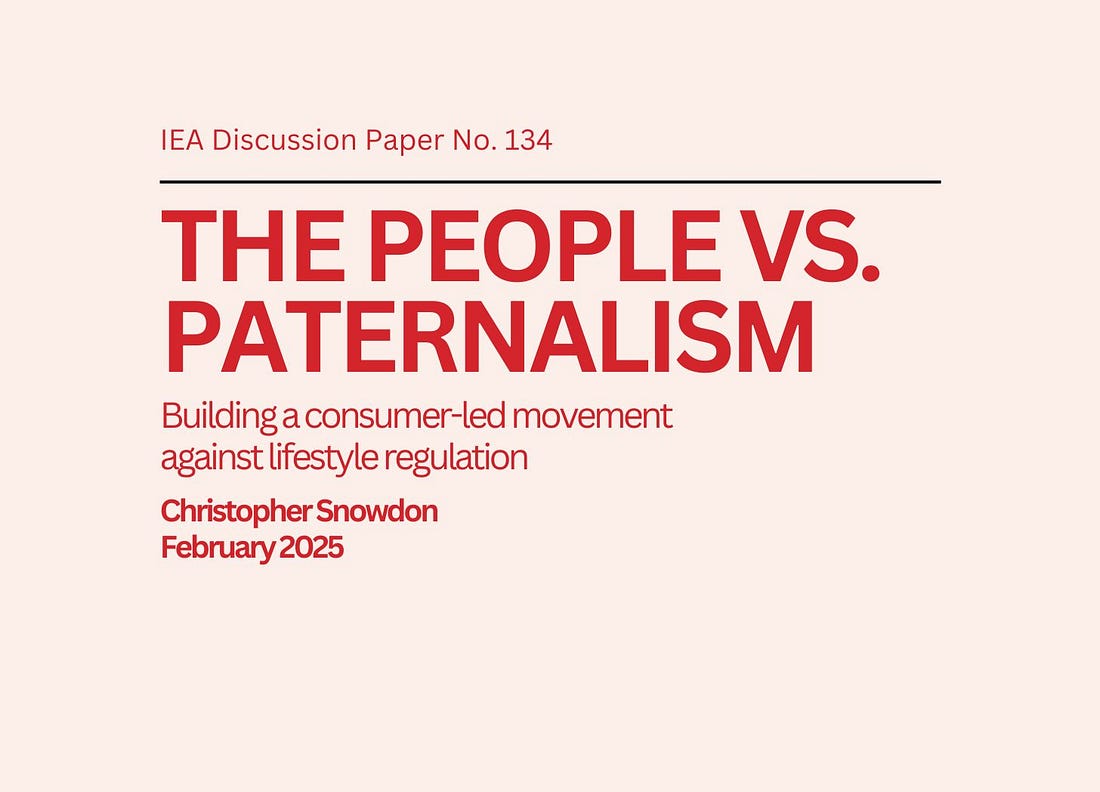|
 |
By Christopher Snowdon
Mancur Olson explained in The Logic of Collective Action (1965) that the free rider problem and the paradox of participation discourage rational consumers from taking collective action to oppose policies that disadvantage them.
The lack of grassroots opposition to 'nanny state' policies from vapers, gamblers, drinkers, etc. seems to bear out this analysis.
Proponents of government paternalism have overcome the problems Olson identified by securing funding from state agencies or by offering selective incentives to their supporters.
Since consumers are unlikely to mobilise to fight for collective benefits, a grassroots movement opposing lifestyle regulation must rely on selective benefits, but this avenue has not been adequately explored by policy entrepreneurs.
This paper outlines what such a grassroots organisation would look like and how it could be established.
Consumer groups should offer discounts and other financial benefits to build support for consumer interests in a sphere too dominated by ‘public health’ campaigners, a new paper published by the Institute of Economic Affairs argues.
Public health activists continuously place pressure on the government to regulate how we live our lives. They justify bans, new taxes, and advertising restrictions, all intended to protect “the public”, and frame the debate as ‘the industry’ versus ‘public health’. The latest round of regulations, including the Tobacco and Vapes Bill, are passing through Parliament swiftly on the back of this campaigning. These regulations increase costs and diminish the freedom of everyday consumers.
In ‘The People Vs. Paternalism’, Dr Christopher Snowdon explains how small, well-organised activist groups overwhelm the dispersed and fragmented voices of the ordinary consumers. These groups are often funded by the government and have a financial incentive to campaign for new restrictions on freedom while consumer groups have few resources and suffer from the ‘free rider’ problem.
Snowdon suggests a solution: a consumer-led movement that attracts members by offering selective incentives. By offering discounts, access to exclusive events and other perks, grassroots coalitions of consumers could emerge and fight for personal freedom.
For example, if an individual chose to form ‘The Vapers’ Association’, they could approach e-cigarette manufacturers and retailers, requesting that they give their members a discount of 10 or 20% off their stock. The annual savings to an individual who takes advantage of this deal could exceed an annual membership fee. The companies would benefit from the deal since it would encourage loyalty to their brand, encourage consumers to switch from other brands and help them promote certain products. This would emulate practice from elsewhere in the private sector, such as with banks offering cashback offers.
An organisation with 10,000 members paying £50 a year would have a budget of £500,000. That would be enough to retain a small, full-time staff to carry out its day-to-day business and to engage in public affairs on issues of interest to the membership. A Drinker’s Union or a Gambling Society could be formed in the same way.
The existing Campaign for Real Ale (CAMRA), which has been an ally of liberals against paternalism on beer and pubs, is an example of this. It attracts members through offering discounted copies of its Good Pub Guide, £30 of real ale vouchers and discounts on beer festivals.
There are practical concerns to consider in setting up such groups. The leadership should steer clear of party politics and political issues outside the remit of the organisation they represent. Incentives for potentially risky products must be handled carefully with safeguards in place including age restrictions. In addition, industry should play no part in running these organisations, and no donations or grants should be accepted from industry. Consumer and industry interests can align and often do, but not always. These must be consumer-first groups that cannot be reasonably accused of being fronts for industry.
Dr Christopher Snowdon, Head of Lifestyle Economics at the Institute of Economic Affairs and the author of the report, said:
“Consumers are at a disadvantage when faced with professional, state-funded neo-prohibitionists. Ordinary people simply do not have the time or money to effectively defend their interests. This report offers some lessons from economics to anyone who wants to resist the encroaching nanny state. Give people direct incentives to take collective action and they will join the fight. Millions of consumers deserve to be heard.”
About the Author
Dr Christopher Snowdon is the head of lifestyle economics at the Institute of Economic Affairs. He has written dozens of reports for the IEA, edits the Nanny State Index, and is the author of several books, including Killjoys.
You’re currently a free subscriber to Insider. For the full experience, upgrade your subscription.
Paid subscribers support the IEA's charitable mission and receive special invites to exclusive events, including the thought-provoking IEA Book Club.
We are offering all new subscribers a special offer. For a limited time only, you will receive 15% off and a complimentary copy of Dr Stephen Davies’ latest book, Apocalypse Next: The Economics of Global Catastrophic Risks.

